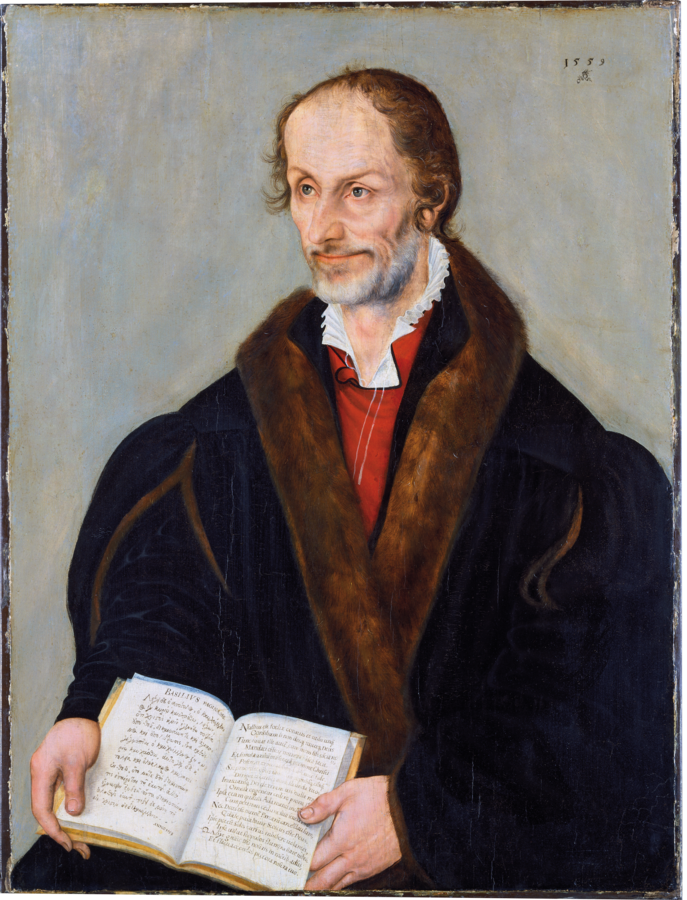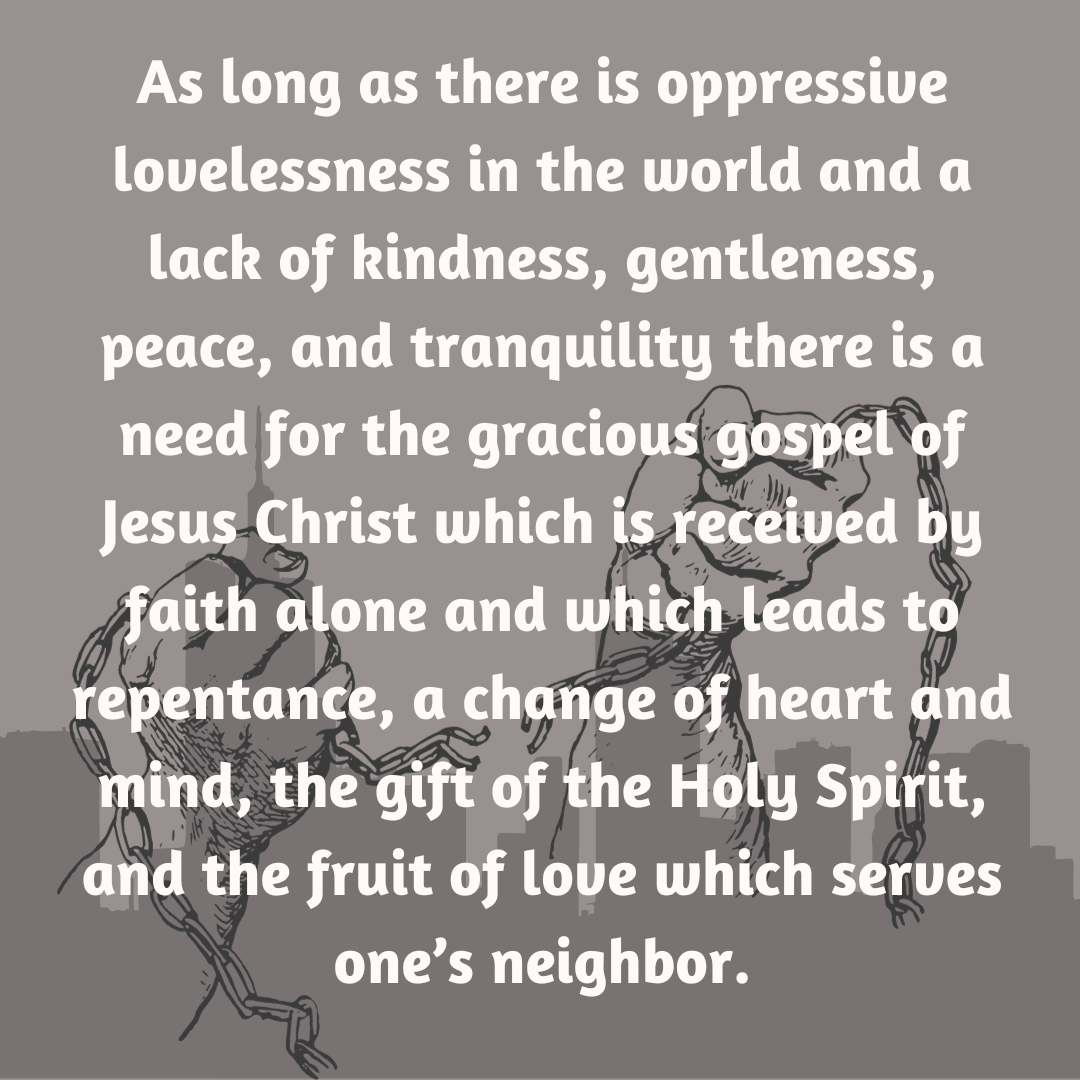Co-missioners,
The year was 1530. That’s when leaders of the incipient Lutheran movement confessed their faith at the Diet of Augsburg and prompted the hostile reaction that drove Philip Melanchthon to pen the counter-response we’ve been poring over these past five weeks. The very title of the response flashes an instant signal of the distance between then and now. Apologia Confessionis in Melanchthon’s late medieval Latin. “The Apology of the [Augsburg] Confession” in antiquated English. In 2023 any newcomer to the document has to be advised immediately that Melanchthon is not about to say sorry for having messed up.
So much has changed over the past 500 years that one is obliged to ask, “Why bother now with Melanchthon’s argument?” Paul Jaster will address this briefly today as he wraps up his masterful tour of the Apology’s long Fourth Article. We take the liberty here of underscoring his emphasis on Article IV’s pastoral dimension. Current critiques of the Reformation’s understanding of justification fail to take this into sufficient consideration, we think. But more on this in future posts.
Speaking of the future—in this case, the near future: as we mentioned last week, the next Crossings Seminar is set for January 28-30, 2024. That’s four months from now. We meet at the Pallottine Retreat Center in St. Louis to explore the theology and practice of preaching. Apology IV is sure to figure heavily in our discussions. An unfolding pilot project in the mentoring of preachers will be featured along the way. Lay participants will be welcomed with open arms, in the expectation that they’ll have important feedback for the folks who speak from pulpits. We pray for your presence. For now, mark your calendars.
Peace and Joy,
The Crossings Community
__________________________________________________________________
A Crosser’s Guide to the Apology of the Augsburg Confession, Article Four: Justification by Faith Alone
by Paul Jaster
(Sixth of Six Installments, continuing from September 21)
Epilogue
The Reformers’ Pastoral Purpose: Confronting Oppressive Lovelessness

Portrait of Philipp Melanchthon
Lucas Cranach the Younger (1515–1586) – From Wikimedia Commons
Melanchthon’s final diagnosis reveals that behind the Reformation and its insistence on “faith alone” (sola fide) was a pastoral purpose. That pastoral purpose was to expose and confront those “power people” in both the church and state who used their control over legislation, proclamation, rites and rituals to enrich themselves, maintain their positions of power, and fund their luxuries and wars at the expense of the peasants and common church folk. They did so by promoting as “acts of love” the sale of indulgences, payments for the masses for the dead, donations made in the course of adoring relics, the cost of pilgrimages, the monetary gifts of satisfaction paid to the church, and the like. As much as the Confessors’ opponents talked about acts of love meriting the infusion of God’s grace, their use of the Christian faith and message resulted in taking advantage of the piety of the lower classes financially and in an oppressive lovelessness.
Apology Four continues to speak wherever and whenever the proclamation the Bible and its message is used oppressively and opportunistically by persons in positions of power. There is still a need in the church of Jesus Christ for there to be a voice that says: Yes, there is a difference between law and gospel – and there is a difference between a law-based Christianity and a Christ-centered evangelical one (in the 1530 Augsburg Confession sense of evangelical). Not every word of Scripture applies to today. God’s word of gospel does “trump” God’s word of law. The Bible cannot not be used to proof text just anything we want. It does matter that sola fide governs sola Scriptura and not the other way around. There is a civil way we can discuss and mediate our disputes, which Melanchthon models for us in the clear and civil way he presents the Confessors’ own position. There is a dangerous God who holds this country and its political activities in account. To this God all lives matter, but especially the poor and disadvantaged. Lovelessness is a sign of faithlessness and a breaking of the two greatest commandments: Love the Lord you God with all your heart, soul, mind and strength and your neighbor as yourself.
We all need to admit that we are in bondage to sin and cannot free ourselves. Luther and his heirs, too, have been complicit in divisive wars, bloody battles, power plays, loveless abuse towards peasants, Jews, native peoples, slaves, persons of color, women, those of alternate sexualities. But we still confess that what we cannot do and do not do, Christ does for us. Faith in Christ is that worship which pleases God the most. It does matter that the message of the gospel honors Christ as mediator and redeemer and that it truly consoles troubled consciences and uplifts hearts. Only forgiveness through faith gives peace, an ultimate peace, within ourselves, with others, and with God. Genuine justifying faith is bound to lead to acts of love. And if love does not follow, then neither justifying faith nor the Holy Spirit remain. The postmodern world in which we live today was shaped by and continues to live with the divide and the fallout of the Reformation. A truthful understanding of the past does have something to say about our present and our future.
As long as there is oppressive lovelessness in the world and a lack of kindness, gentleness, peace, and tranquility there is a need for the gracious gospel of Jesus Christ which is received by faith alone and which leads to repentance, a change of heart and mind, the gift of the Holy Spirit, and the fruit of love which serves one’s neighbor. This is the driving pastoral concern of Apology Four—and of the Augsburg Confession; of the entire Reformation—which still goes on today.
Thursday Theology: that the benefits of Christ be put to use
A publication of the Crossings Community




You must be logged in to post a comment.